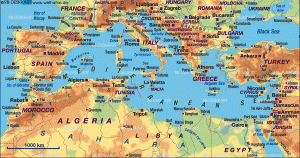
Do You Want To Eat Delicious Food That’s Amazingly Healthy – and Manage Your Weight, Too?
Eat Like A Greek . . .
or like others who live in Mediterranean countries. I was born and raised in New York City and grew up eating a Mediterranean-type diet at home. My father is Greek and I went to Greek day school so this type of eating pattern was what I knew. It was our way of life — not a studied, intentional choice. We ate lots of olive oil, fish, vegetables, and cheese — the mainstay was feta in brine from the barrel in the Greek grocer’s across the street from the Greek church. Olives came that way too, straight from the barrel, straight from Greece. And, we spent a lot of time eating with family – and friends of the family.
But, living in NYC and hanging out with my neighborhood friends, that healthy diet became infused with “staples” of the standard American diet. That infusion came in the form of food like bagels, butter for the bagels, burgers, English muffins, the occasional coca cola, egg creams, cheese Danish, movie theater candy, and Velveeta (for grilled cheese made with soft white bread). In NYC there was always the attraction of pizza (sold by the slice) and Good Humor trucks for that after dinner summer treat. All in all, not too bad — in large part because, at that time, there wasn’t a fast food shop on every corner and eating between meals wasn’t a common (or acceptable) practice.
I just returned from a family trip to Greece and after eating food straight from the farm and fished from the sea, I’m convinced (and this is backed up by many research studies) that the diet I grew up on – the Mediterranean diet — is an extremely healthy dietary pattern and a very healthy way of life.
The Mediterranean Diet Is A Way Of Life
Dietary data from the Mediterranean region show that people who follow a Mediterranean dietary pattern have the lowest recorded rates of chronic diseases and the highest adult life expectancy. The health benefits are backed up by more than 50 years of epidemiological and experimental research.
The Mediterranean dietary pattern is not the type of restrictive program that we usually think of when we think “diet.” It’s a way of life – even the Greek word for diet, diaita, means way of life.
 Traditional Mediterranean meals, the kind eaten for thousands of years by people who live in the countries bordering the Mediterranean Sea, are filled with fruit, vegetables, beans and legumes; bread, pasta, rice, semolina and other grains; nuts and seeds; copious amounts of extra virgin olive oil; lesser amounts of fish, poultry, eggs, and even smaller amounts of lean red meat; cheese and yogurt; and moderate amounts of wine, usually red.
Traditional Mediterranean meals, the kind eaten for thousands of years by people who live in the countries bordering the Mediterranean Sea, are filled with fruit, vegetables, beans and legumes; bread, pasta, rice, semolina and other grains; nuts and seeds; copious amounts of extra virgin olive oil; lesser amounts of fish, poultry, eggs, and even smaller amounts of lean red meat; cheese and yogurt; and moderate amounts of wine, usually red.
The “Mediterranean diet” (very similar to the Dash diet for high blood pressure) doesn’t have a strict list of allowed/not allowed foods. It’s a dietary pattern of lots of plant foods; small amounts of fish, dairy, and animal protein; and very few saturated fats. Physical activity is a given as is leisurely dining with friends and family in pleasant surroundings with everyone taking pleasure in their meals. Even with plenty of healthy fats and some alcohol, weight problems are not common.
Why Is The Mediterranean Lifestyle A Good Choice?
The Mediterranean lifestyle – including foods, activities, meals with friends and family, and wine in moderation with meals — has been studied and called one of the healthiest in the world. It is also a dietary pattern filled with delicious and flavor-filled food and meals. The health benefits are not from diet alone but from the whole package.
According to the Mayo Clinic, a recent analysis of more than 1.5 million healthy adults showed that people who follow a Mediterranean diet have a reduced risk of overall and cardiovascular mortality, a reduced incidence of cancer and cancer mortality, and a reduced incidence of Parkinson’s and Alzheimer’s diseases.
Studies published in the medical journal BMJ and The New England Journal of Medicine showed that healthy people who follow a Mediterranean diet had a lower risk of developing type 2 diabetes and that a restricted calorie Mediterranean diet can be more effective for weight loss than a low fat diet.
An analysis of 50 studies linked the Mediterranean diet to lower odds of getting metabolic syndrome, a group of factors (high blood pressure, high blood sugar, unhealthy cholesterol levels, and abdominal fat) that increases the risk of heart disease, diabetes, and stroke.
All of the fruit, vegetables, whole grains, nuts, beans, seeds, fish, olive oil, and some alcohol in the Mediterranean eating pattern provide an astounding number of micronutrients, antioxidants, vitamins, and minerals which, in combination with the Mediterranean lifestyle, produce health benefits that can’t be obtained from supplements.
Keys To The Mediterranean Way Of Eating and Living
Fruits, vegetables, nuts and grains: The majority of food is from plant sources: fruit, vegetables, potatoes, breads and grains, rice, pasta, beans, nuts, and seeds. Greeks eat little red meat but average nine servings a day of fruit and vegetables – which may explain why the Mediterranean diet is associated with lower levels of LDL (“bad”) cholesterol. The majority of food should be a variety of minimally processed, locally grown (if possible), seasonal fruit and veggies (7 to 10 servings a day). Focus on whole-grain bread and cereal, rice, and pasta. Bread is important but is eaten plain or dipped in olive oil. The majority of grains are whole grains like wheat, oats, rice, rye, barley, and corn, best eaten in whole, minimally-processed forms.
Nuts: Nuts are part of a Mediterranean lifestyle. They are high in fat — around 80% of their calories come from fat — but most of it isn’t saturated. Because nuts are high in calories, try not to eat more than a handful a day.

2500 year old olive tree in Nea Epidaurus, Greece Healthy fats: Olive oil, a monounsaturated fat that can help reduce LDL cholesterol levels, is the principal fat. “Extra-virgin” is the least processed and contains the highest levels of antioxidant protective plant compounds. Use olive or canola oil for cooking, too. The Mediterranean diet doesn’t focus on limiting fats, but on making smart choices. It does discourage eating saturated and trans fats (hydrogenated oils), which contribute to heart disease. Total fat should range from less than 25% to over 35% of calories with no more than 7 to 8% saturated fat.
Wine: According to some research studies, alcohol, in moderation, is associated with a reduced risk of heart disease. The Mediterranean diet includes a moderate amount of wine, usually red — no more than 5 ounces daily for women (or men over 65), and no more than 10 ounces daily for men under 65 (unless there are reasons not to drink). If you don’t drink alcohol, you don’t have to start. Purple grape juice might have some similar benefits (although it is high in sugar).
Dessert and Sweets: Eat sweets in small portions. Fresh fruit is the usual daily dessert and the typical way to end a meal. Desserts and sweets with a significant amount of sweetener, usually honey, should be eaten only a few times a week.
Herbs And Spices: Herbs and spices add flavor and aroma and reduce the need for salt and/or fat. They also contain a broad range of health-promoting antioxidants. They’re used liberally and contribute to the dishes that differentiate the various Mediterranean cuisines.
Fish and Poultry: Have moderate amounts of fish and poultry once or twice a week (fish is favored over poultry). Healthy choices include cold-water fish: fresh or water-packed tuna, salmon, trout, mackerel and herring. Eat your fish grilled or sautéed, not fried, in a small amount of olive oil.
Meat: Eat lean red meat only a few times a month – no more than once a week for animals with four legs. Substitute fish and poultry for red meat. Poultry is a good source of lean protein without the high levels of saturated fat found in some cuts of red meat. Keep meat portions small (about the size of a deck of cards) and avoid sausage, bacon, and other high-fat meats. With ground meat, choose 90 percent lean/10 percent fat.
Low fat dairy: Eat cheese and yogurt daily, but in low to moderate amounts. The calcium in cheese and yogurt is important for bone and heart health. Limit high fat dairy products like whole or 2% milk and full fat yogurt, cheese, and ice cream. Switch to non-fat, skim, and 1% products when possible.
Eggs: A good source of high-quality protein, eat up to seven eggs a week – this number includes those used in baking and cooking.
Regular Physical Activity: Daily physical activity is important for overall good health. This includes strenuous exercise like running and aerobic activity as well as slower-paced activities like walking, housework, yard work, and taking the stairs instead of the elevator.

Seaside tables in Gythio, Greece Meals with Family and Friends: A key component of the Mediterranean lifestyle is sharing and enjoying meals with family and friends of all ages. Don’t rush through meals but sit and enjoy both the food and the company.
Make It your Own
There’s no single Mediterranean diet. Countries and regions customize the basic diet by taking advantage of locally available food and the cultural preferences of that geographic region.
The Mediterranean diet is a prescription for good health. Aside from all of the other health benefits, there might be a weight advantage because being physically active and eating a nutritious diet of mostly filling and satisfying whole foods can help with weight management.
The Mediterranean diet is a healthy, enjoyable lifestyle and dietary plan that is easy to follow, flexible, and best of all, good for you. It doesn’t matter where you live. Locally sourced foods are best, but if your only choice is to buy more plant-based foods and fish in the supermarket, that’s still a step in the right direction. Try making small changes – each change is incremental and starts to add up. Just don’t forget to eat delicious fresh food, move around, eat leisurely, and share your eating experience with friends and family.

Leave a Reply